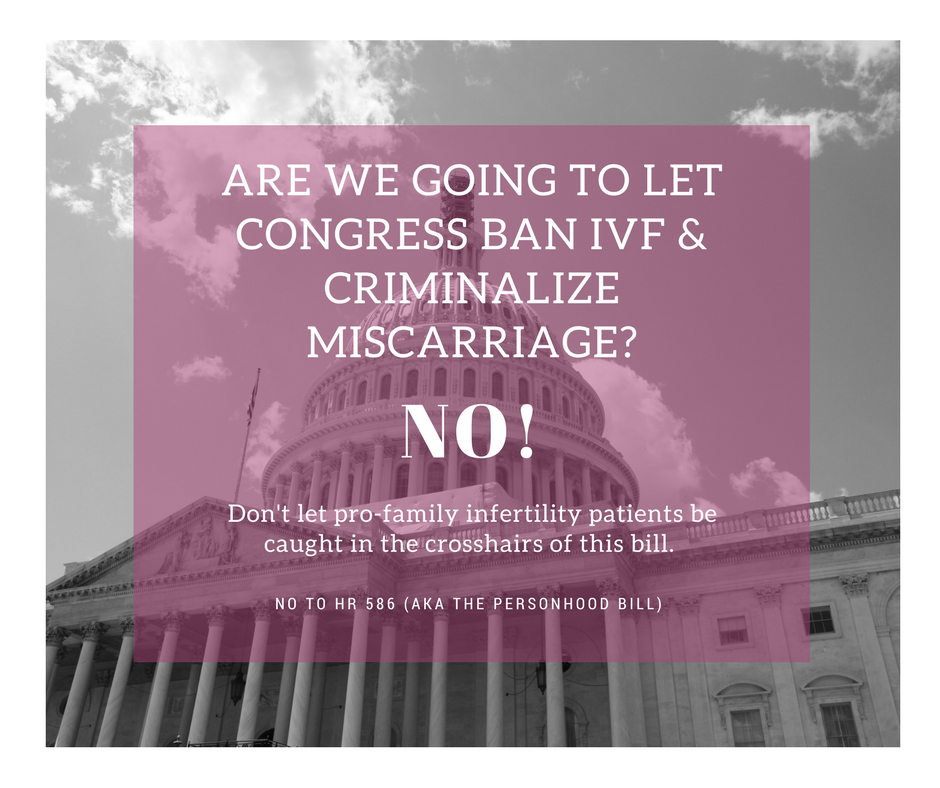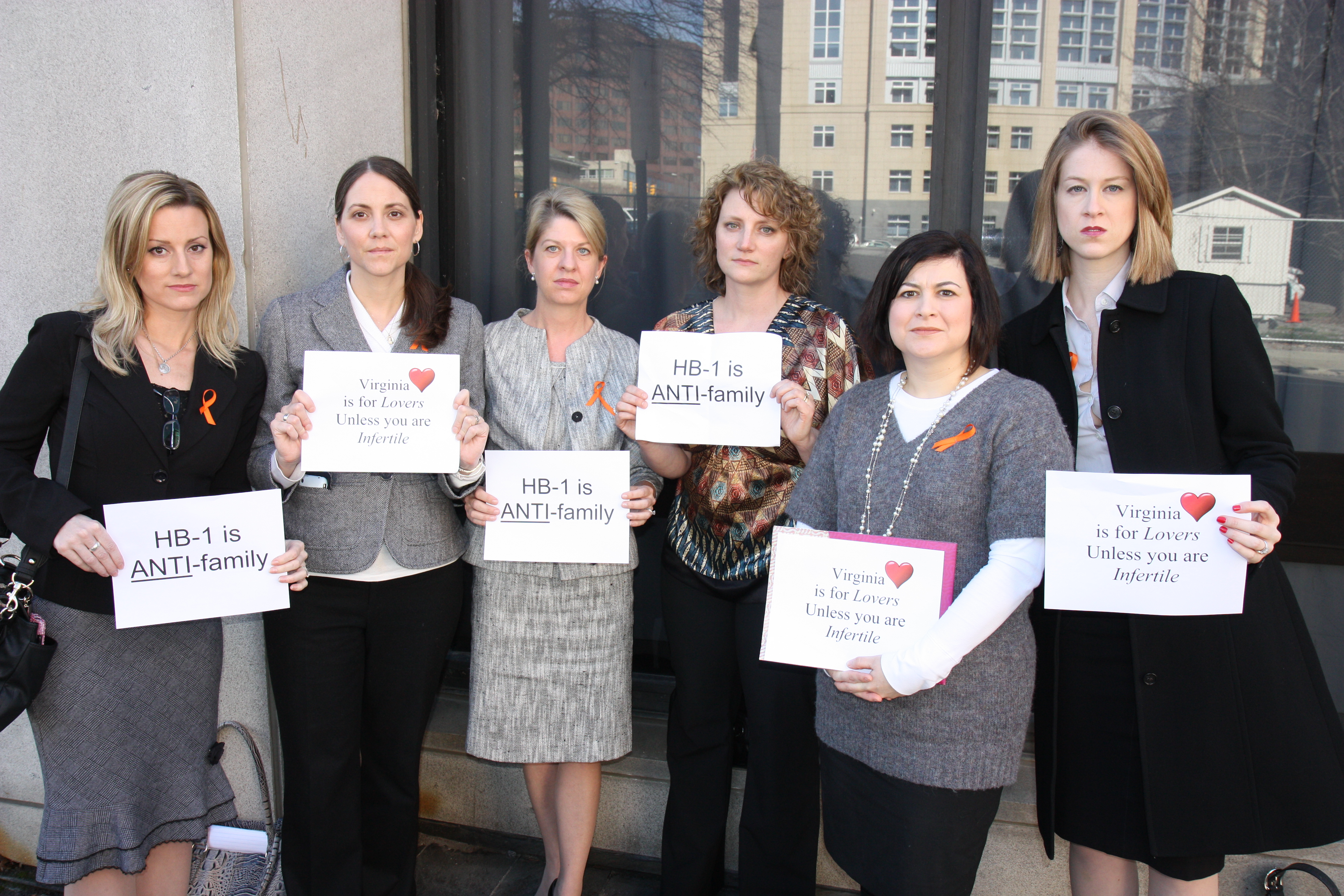Personhood legislation is back and it’s federal. The Sanctity of Human Life Act, HR 586, was introduced in the House of Representatives on January 17, 2017 by Rep. Jody Hice (R-GA). It’s been introduced all over the U.S. over the last handful of years at the state level and the national level, too. Yes, the same thing I helped RESOLVE fight in Virginia in 2012. Most of the legislation has been defeated in the past, but now we are in a very different political climate and we need to pay attention and act. This bill absolutely could effectively ban assisted reproductive treatment as we know it. It would be devastating to infertility patients if passed. In a way, it’s simple, but in a way, it’s also quite complex. Since posting about this bill on my Facebook advocacy page a few days ago, so many of you have had questions, so I wrote this to help address those questions.
What is personhood?
It grants full human rights to a microscopic fertilized egg or embryo.
What is in vitro fertilization (IVF)?
IVF is the process of using hormones to stimulate a woman’s ovaries to produce eggs, then removing those eggs from the ovaries and fertilizing them with the man’s sperm in the lab to create an embryo or embryos. After developing and growing for three to five days, the embryo/s are then placed into the woman’s uterus. The desired result is that the embryo implants successfully to the uterine wall.
What does the bill say?
Not much. It defines an embryo as person. In part, it says,
the life of each human being begins with fertilization, cloning, or its functional equivalent, irrespective of sex, health, function or disability, defect, stage of biological development, or condition of dependency, at which time every human being shall have all the legal and constitutional attributes and privileges of personhood;
What is the bill aimed at?
The bill is clearly aimed at trying ban abortion. It is less clear, however, whether taking down IVF in the process is intended or unintended. My opinion is that it is intentional because these bills and this personhood movement have been around for a while and the infertility community has fought it every step of the way. If they didn’t intend to affect assisted reproductive technology, then they would have learned by now, and accounted for that with exclusions.
I don’t get it. It doesn’t say anything about IVF.
It doesn’t have to. By redefining something so boldly, it has enormous consequences that are far-reaching. It turns everything upside down.
Ok, so how would it ban IVF?
I’m going to use the words of fellow infertility advocate, Keiko Zoll, as she succinctly summed it up,
If a fertilized embryo is given the legal rights of personhood, that means anything that would destroy that embryo is legally akin to “killing” a person — making REs, embryologists, and even potentially IVF patients criminals if something were to happen to any embryos deemed “persons” by HR 586. There is no way to guarantee the survival of every embryo created via IVF, thus, HR 586 effectively bans the practice of IVF as there is no way to safely perform the procedure to comply with the law as interpreted in the bill.
What about miscarriage? How could personhood potentially criminalize that?
Here’s a scenario. I personally have uterine issues. I have fibroids. I have a uterine septum, that at one point during treatment was removed. And, finally, my ultimate problem is thought to be a complex reproductive autoimmune issue (i.e. my body). So, given all of these issues, will I not be allowed at all to use IVF at all because I have a “hostile” uterine environment? Or, if I did IVF knowing I have a lesser chance than a perfectly healthy woman, would that be considering endangering an embryo? Then, if it doesn’t implant at all or I miscarry, am I criminally charged? Is my doctor liable?
What are some examples? (from RESOLVE’s website)
- If one or more microscopic embryos from an IVF cycle do not develop normally in the lab or fail to result in live births after transfer (all natural events), could the physician, lab, and/or patient be criminally liable?
- Would non-IVF treatments such as simple inseminations be threatened because they carry a risk of miscarriage? Would clinics with high miscarriage rates after inseminations be at risk for criminal liability? Could the miscarrying women be subject to criminal charges?
- Not all frozen embryos thaw successfully. Could embryo freezing be prohibited as too risky?
Well, that’s crazy. What about women who didn’t use fertility treatments?
While no one would be immune, there are some differences.
- A normal women not undergoing fertility treatment wouldn’t even necessarily know if she miscarried really early. It would seem like a normal period.
- A woman not using fertility treatments wouldn’t necessarily know about a vanishing twin because she wouldn’t have had an ultrasound or repeating betas nearly as early as women undergoing fertility treatment.
- If someone got pregnant normally, took a home test and knew about the pregnancy, then miscarried early…she wouldn’t have necessarily been to the doctor yet. There would be no record of her miscarriage. For those of us using assisted reproductive technology, everything is meticulously documented and there would be records to subpoena.
- If women had later miscarriages and went to the doctor, who knows? Would you be questioned about what you did wrong? I don’t know? None of this is accounted for. It would be open to judgement and litigation.
- Also, what about any woman with an ectopic pregnancy? Would she be able to receive life-saving treatment, or would the embryo’s legal rights have to balanced against hers?
What do the experts say?
This page on RESOLVE’s website provides lots of information. Their position is the following:
The effect of Personhood Legislation would be to threaten a medical treatment that has, since being pioneered in 1978, brought some four million babies to loving infertile couples around the world. At a minimum, it would force changes in the practice of reproductive medicine (e.g., limitations on the number of eggs that may be fertilized) that are not in patients’ best interests and constitute inferior medical practice.
RESOLVE states that their position is consistent with that of other experts such as the American Society for Reproductive Medicine, the Society for Assisted Reproductive Technology, the American Academy of ART Attorneys and the American Congress of Obstetricians and Gynecologists
What if I’m pro-life?
If you’re pro-life, then I hope you see that it’s unfair to take legislation aimed at those who don’t want children to devastatingly affect pro-family infertility patients’ right to treat their disease. People that WANT children. People that care more about their embryos than you can possibly imagine. People that have embryos as their child’s first photo. Pro-family is pro-life. Pro-life is pro-family. You can still support trying to ban abortion, just not in this way and not with this bill.
Other articles about personhood
- RESOLVE’s position on personhood
- How Would The Personhood Bill Affect IVF? It Hurts Couples Relying On Medical Intervention
- Here Is Exactly How Personhood Measures Would Outlaw IVF
- RESOLVE’s email letter template (I recommend the below, however this might be good to share to ask family and friends to participate.)
What can you do?
- CALL /Call your representative in the House of Representatives. Find your rep. Read why calling is the best.
- WRITE / Follow it up with a mailed letter to your rep, too. For those who have IVF babies, I recommend also including a picture of your child/ren.
- KEEP GOING / Still mad and want to do more? Be proactive. The bill will likely move forward and it’s next stop is the House Judiciary Committee. I recommend contacting the Chair and the members of the committee. The chair, Bob Goodlatte, a conservative Republican, just so happens to be in my area and the rep for many of my family and friends. PRO-tip: I sent a letter to the Ranking Member to make sure he also understood the lesser known consequences the bill would have on the infertility community.
- ROCKSTAR STATUS / Make an appointment with your House Representative at their office closest to you. Whether it’s with an aide or the member. Seeing you face to face will make the issue come alive for them. Or, forget the appointment and just pop by. Say that you wondered if they might have 5 minutes to discuss something important with you.
- SHARE / Share this post. Write your own post. Write on Facebook or Twitter. Send an email to family and friends. Ask them to call and write their Congressional representative, too.
Questions? Thoughts? If you do any of these things listed above, let me know how it goes.
Let’s be friends
See some of my other infertility posts
Get emails when I have new posts
Follow on Instagram | Follow on Facebook | Follow on Twitter




1 Comment
[…] What you should know about HR 586 […]